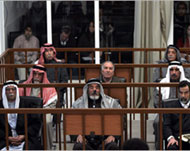Saddam ends hunger strike
Saddam Hussein has ended a hunger strike he began earlier this month to protest against the conduct of his trial, his chief lawyer said on Monday, a day before the ousted Iraqi leader was due back in court.

Saddam, on trial since October for crimes against humanity, complicated already chaotic proceedings at the last hearing on 14 February saying that he and seven co-accused were refusing food.
Khalil Dulaimi, who met Saddam for seven hours in Baghdad on Sunday, told Reuters: “The president maintained his hunger strike for 11 days, but was forced to end it for health reasons.”
The 68-year-old former president has accused the court of forcing him to attend hearings that he wished to boycott.
Dulaimi said US prison officials overseeing Saddam’s custody had contacted defence lawyers over the hunger strike to “prevent any adverse health impact”. He said the ex-leader had lost some weight but gave no details.
Chief prosecutor Jaafar al-Moussawi said Saddam’s refusal to eat was in protest at being kept separate from his co-defendants in holding cells at the court before proceedings began.
“During the last two sessions he was isolated from other defendants before attending the court room,” he said. “He was put in a special room with basic services.”
Al-Moussawi said court officials would change the arrangement.
Saddam Buoyant
Dulaimi said Saddam showed “high morale” when he met him alone to deliberate a defence strategy after his lawyers walked out of the trial last month in protest at court proceedings.
The defence team was banned from meeting Saddam after the walkout, but Raouf Abdel Rahman, the chief judge, has lifted the ban to enable Saddam’s lawyers to return for Tuesday’s hearing.
 |
|
Saddam’s lawyers accused Judge |
Saddam’s defence team had accused Abdel Rahman of bias and had said it would not return to court until he resigns.
Dulaimi said he would ask the court to postpone the next session, citing worsening security in Iraq. More than 200 people have been killed since a Shia mosque was bombed on Wednesday.
“We hope the court will … postpone tomorrow’s hearing for the sake of preserving the lives of lawyers, witnesses and everyone concerned,” Dulaimi said.
The trial has been buffeted by the killing of two defence lawyers and charges of political bias. Two months ago the previous chief judge quit, complaining of government meddling.
Documents
Prosecutors will now devote two days to reading documents from Saddam’s era in power, the last evidence that will be heard before specific charges are formulated, court sources said.
 |
|
Saddam is charged over the |
The memoranda, letters and court orders will allegedly link Saddam and his co-accused to the deaths of 148 Shia from the town of Dujail in reprisal for a 1982 attempt on his life there.
The tribunal is then expected to recess for another two to three weeks.
Dulaimi said the defence would present a formal case against Abdel Rahman on the grounds that his Kurdish background meant it was difficult for him to show impartiality.
Saddam, who ruled Iraq for three decades, faces death by hanging if convicted.